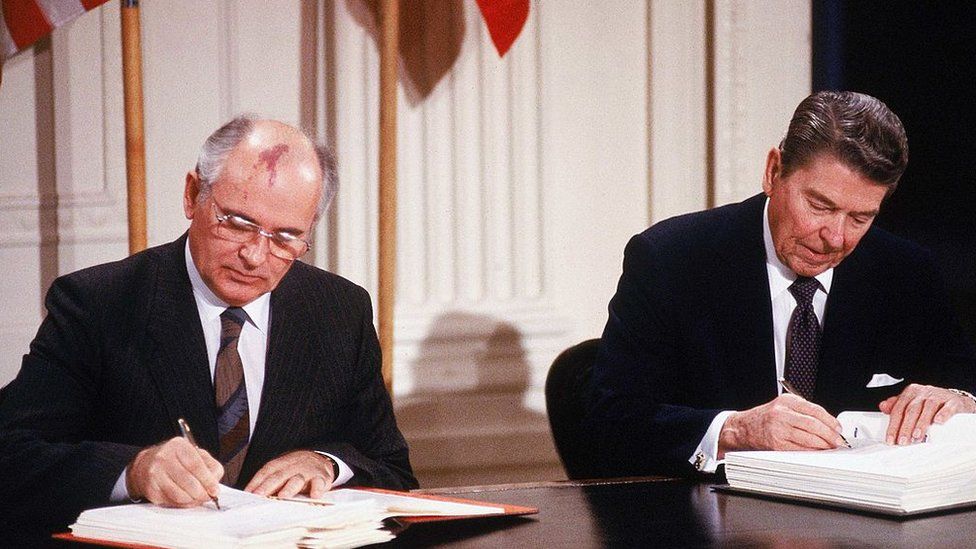The Russian Liberator
"The country was loaded to the brim with weapons. And it would have immediately pushed the country into a civil war [had he attempted to restrain satellite Soviet nations from freeing themselves from the grip of the Soviet Union].""I see myself as a man who started the reforms that were necessary for the country and for Europe and the world.""I consider the decision of your Committee [Nobel Peace Prize] as a recognition of the great international importance of the changes now under way in the Soviet Union, and as an expression of confidence in our policy of new thinking, which is based on the conviction that at the end of the 20th century force and arms will have to give way to a major instrument in world [affairs]."Soviet leader Mikhail Gorbachev
 |
| This photo taken in July 1991 shows then-U.S. president George Bush, left, and Gorbachev during a press conference in Moscow concluding the U.S.-Soviet Summit dedicated to disarmament. (Mike Fisher/AFP/Getty Images) |
A born conciliator, Mikhail Gorbachev was, nonetheless, a committed Communist and as supreme leader of the Soviet Union he had the authority to match his desire to update the USSR, to loosen some of its strictures on personal freedoms of its citizens with his intentions. He wanted to create an atmosphere that would be conducive to opening markets to expansion as well, to lift the USSR out of poverty and begin to institute reforms to bring economic stability to the empire he ruled. Never might he have imagined that his forthright admission the USSR was mired in a straitjacket of tyranny but it must be preserved and altered, would lead to its dissolution.
His intention was to salvage the empire he saw crumbling around him, one that he was committed to, but could nonetheless envision the beneficial effects of instituting new and looser structures within the command perimeter. His vision was flawed only by his inability to foresee the near future. He was celebrated globally for his previously unheard-of efforts to open a closed society to scrutiny and change and to begin fostering improved relations with the West.
 |
| Ronald Reagan and Mikhail Gorbachev signing the Intermediate-Range Nuclear Forces Treaty in 1987 Getty Images |
His legacy, when the dust settled, was to inspire Soviet satellites to break the mould of control and dependence the Soviet Union had trapped them in, and one after the other they responded to Mr. Gorbachev's goodwill by abandoning their satellite roles and declaring their internationally recognized sovereign political rights as separate nations. The Eastern European colossus faltered, failed and fell under the executive decision-making that gave hope to tens of millions of non-Russians and astonished and disappointed millions of Russians.
When Mr. Gorbachev realized he had walked into a trap of his own oblivious making, it was too late to try to stop the bleeding. And nor could he consider from a humanitarian standpoint, exerting the power and strength of Russia to staunch the bleeding. For, as he reminisced years later, he feared chaos erupting in the nuclear-armed country and the resulting loss of untold numbers of lives.
The end of the Cold War era of mutual fear and suspicion and mutual-assured-destruction that teetered more than once on the edge of loosing nuclear weapons, brought a Nobel Peace Prize to this man who watched in dismay as his tentative steps toward loosening restrictions and out-facing corruption, transformed his benign intentions into a rapid decline of the empire he had inherited for a brief period but had in that briefest of periods, completely upturned; not only the USSR but Eastern Europe and the entire international community.
Russian politicians and the ordinary Russian-on-the-street all held Mr. Gorbachev responsible for the dismantling of the Soviet Union through his "Glasnost" and "Perestroika" (openness and restructuring) initiatives. In the process, he freed political prisoners, permitted open debate and multi-candidate elections. Russians were granted the freedom to travel, religious persecution was brought to a halt. He reduced nuclear arsenals and established closer ties with the West. When Eastern European satellite states shed their Communist regimes, he did nothing in reaction.
 |
| Putin pays his last respects near the coffin of Gorbachev at the Central Clinical Hospital in Moscow on Thursday. (Russian pool/The Associated Press) |
With these releases of the Soviet tentacles on satellite states, came an increase in ethnic tensions and resentments. In his later years, this man who substantially changed the world order in his time both criticized and praised the current Russian President, Vladimir Putin. Who, on assuming power from Mr. Gorbachev's former protege, Boris Yeltsin, set about dismantling all of Mr. Gorbachev's and Mr. Yeltsin's democratic achievements.
Mr. Gorbachev was invested in avoiding war. Mr. Putin's attitude was that war was necessary to begin the task of re-establishing the satellite network among Russia's unwilling neighbours in its near-abroad, which once formed part of its powerful empire. In his later years, an ailing Mr. Gorbachev retreated from public view and had less to say about his nation's politics. At age 91 he was admitted in failing health to the Central Clinical Hospital where he died after a long illness, two days ago.
| Russian President Vladimir Putin, right, listens to former President of the Soviet Union Mikhail Gorbachev during a news conference in Schleswig, Germany, Dec. 21, 2004. Gorbachev died Tuesday. (Christian Charisius/Reuters) |
Labels: Former Soviet Union President Mikhail Gorbachev, Glasnost, Perestroika, Russian Federation, USSR, Vladimir Putin

0 Comments:
Post a Comment
<< Home